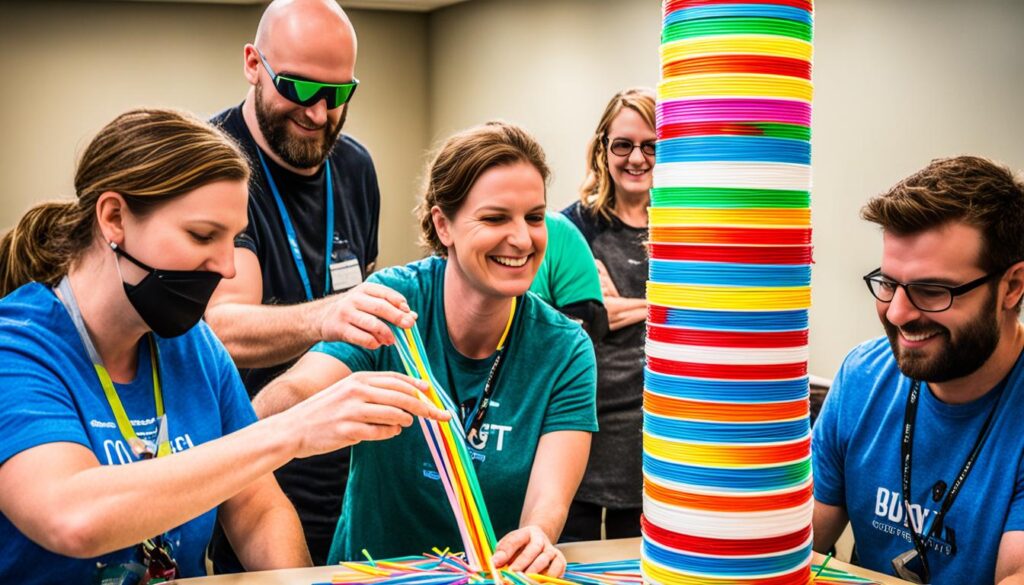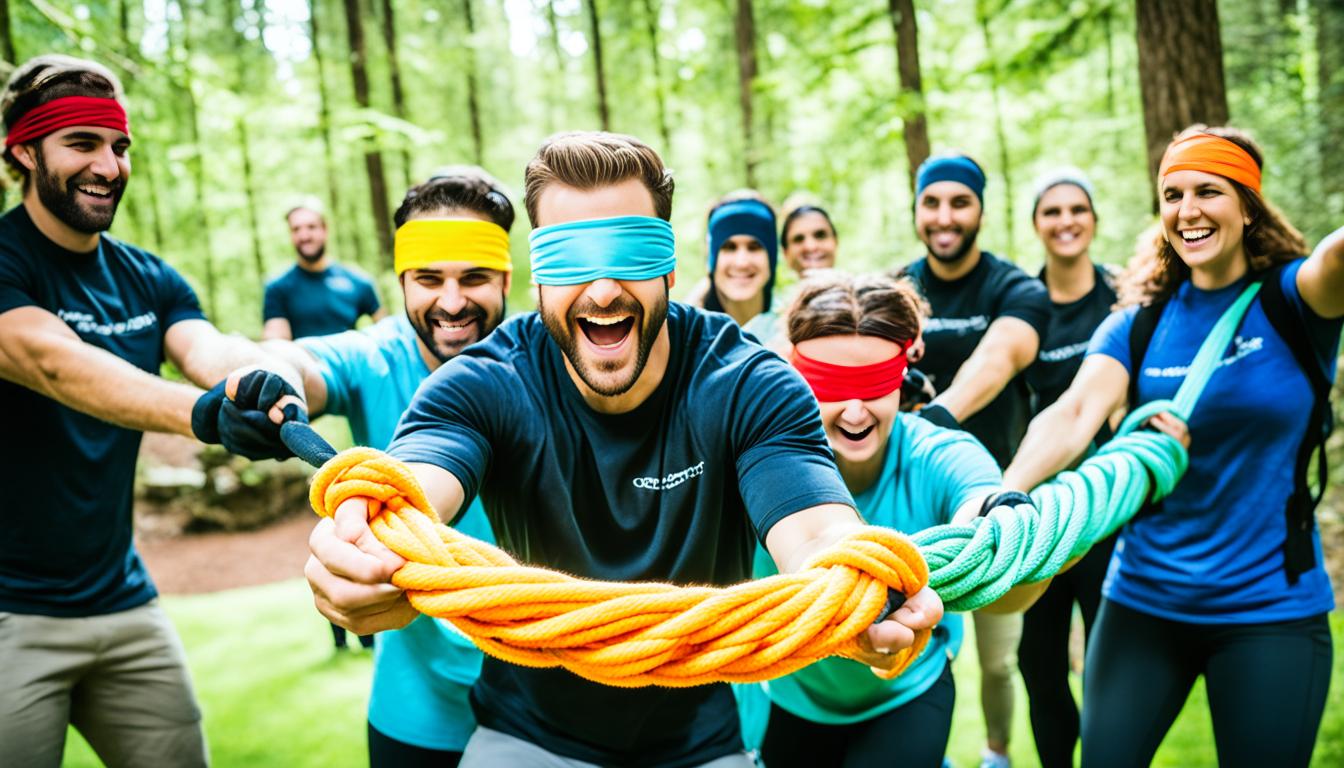Teamwork is the backbone of any successful organization. When team members collaborate effectively, share ideas, and support one another, it can lead to increased productivity, improved morale, and better outcomes. But building strong teams doesn’t happen overnight; it requires intentional effort and the right activities to foster positive team dynamics.
Imagine a team where everyone works in silos, communication is lacking, and there’s a general lack of trust and cohesion. Let’s say this team consists of individuals who are brilliant, talented, and experienced in their respective roles. On paper, they seem like the dream team, but in reality, they struggle to work together and produce the desired results.
Now, picture another team. This team also consists of talented individuals, but instead of working in isolation, they actively engage in team dynamics activities and team building exercises. They collaborate, communicate openly, support each other’s progress, and celebrate wins together. As a result, they consistently meet their goals, exceed expectations, and enjoy a positive work environment.
Which team would you rather be a part of? The answer is clear. Effective team dynamics activities play a crucial role in fostering collaboration, improving communication, and strengthening relationships among team members. These activities help create a positive work culture, where individuals thrive, and the team achieves remarkable success.
Key Takeaways:
- Effective team dynamics activities are essential for boosting productivity and collaboration.
- Engaging in team building exercises promotes communication, trust, and teamwork.
- Innovative and varied activities are necessary to keep teams engaged and motivated.
- Team dynamics activities can be adapted for new teams, established teams, remote teams, and outdoor settings.
- Problem-solving games and activities improve teamwork, communication, and problem-solving skills.
Icebreaker Games for New Teams
Icebreaker games are essential for new teams to get to know each other and build rapport. These activities create a comfortable and informal setting for team members to connect and build affinity. Here are some popular icebreaker games that encourage group collaboration and team bonding:
- Human Lie Detector Game: In this game, team members take turns sharing three statements about themselves, two of which are true and one is false. The rest of the team has to guess which statement is the lie, promoting active listening and observation skills.
- Name Toss Game: Team members stand in a circle and toss a ball or object to each other. Each time someone catches it, they have to say the name of the person they are throwing it to. This game helps team members learn names while improving communication and coordination.
- Story Circle Game: Team members sit in a circle, and each person contributes a sentence to create a collective story. This game encourages creativity, active listening, and collaboration.
- Common Ground Game: Team members pair up and try to find as many things they have in common within a specific time limit. This game fosters connections, encourages empathy, and breaks down initial barriers.
These icebreaker games help teams bond, establish trust, and create a positive atmosphere for collaboration. They lay the foundation for effective group dynamics, enhancing overall team productivity.
Team-Building Exercises for Established Teams
Once a team is comfortable with each other, it’s important to engage in team-building exercises that promote communication, leadership development, and teamwork. These exercises are designed to enhance the existing dynamics within the team, fostering a more collaborative and productive environment.
Here are some effective team-building activities that established teams can undertake:
1. The Favorite Moments Activity
This activity encourages team members to reflect on and share their favorite moments of working together. It helps create a positive and supportive atmosphere, reinforcing the team’s achievements and strengths. Each team member takes turns sharing a favorite moment and explaining why it was meaningful to them.
2. The Survival Scenario Game
This activity presents teams with hypothetical survival scenarios, such as being stranded on a desert island or surviving a natural disaster. Teams must work together to brainstorm solutions and make collaborative decisions. This game promotes problem-solving, critical thinking, and decision-making skills.
3. The Unique Use Game
In this activity, teams are given a random object and tasked with coming up with as many unique and creative uses for it as possible. This exercise encourages teams to think outside the box and fosters innovative thinking. It also strengthens collaboration and communication as team members work together to generate ideas.
4. The Compliment Circle
The Compliment Circle activity is designed to build trust and boost team morale. Team members sit in a circle and take turns giving compliments to each other. This exercise helps create a positive and supportive team culture, encouraging appreciation and recognition among team members.
By engaging in these communication exercises, leadership development activities, and other team-building exercises, established teams can enhance their communication, problem-solving, and collaboration skills. These activities promote a positive team culture, strengthen relationships, and ultimately contribute to the team’s success.

Virtual Team Building Exercises for Remote Teams
With the rise of remote work, virtual team building exercises have become essential. These activities help remote teams feel connected and eliminate the distance barrier. Effective virtual team building exercises promote collaboration, communication, and team bonding in a virtual setting. Here are some popular virtual team building exercises:
- Online Escape Rooms
- Virtual Scavenger Hunts
- Personality Quizzes
- Virtual Show and Tell
Online escape rooms offer an exhilarating immersive experience where team members work together to solve puzzles and escape a virtual room. This activity encourages teamwork, problem-solving, and critical thinking skills. Virtual scavenger hunts create a sense of adventure and require teams to collaborate and communicate effectively to find hidden items or solve clues. Personality quizzes provide a fun way for team members to learn more about themselves and each other, fostering understanding and camaraderie. Virtual show and tell sessions allow team members to share personal objects or stories, promoting connection and empathy within the virtual team.
These virtual team building exercises can be easily facilitated through video conferencing platforms, collaboration tools, and online platforms specifically designed for remote team building. By engaging in these activities, remote teams can strengthen their bonds, improve communication, and enhance their overall teamwork capabilities.

Outdoor Team Building Activities
Outdoor team building activities provide a change of environment and foster a sense of adventure and teamwork. These activities offer a refreshing break from the traditional office setting and allow teams to bond and collaborate in a new and exciting way.
One popular outdoor team building activity is hiking, which not only promotes physical fitness but also encourages teamwork and problem-solving. As team members navigate through challenging terrains and reach the summit together, they learn to support and motivate each other, fostering a strong sense of camaraderie.
Another option is camping, where teams work together to set up tents, gather firewood, and cook meals. This activity requires effective communication and coordination, helping team members develop essential skills such as planning, organization, and resource management.
Obstacle courses are another popular choice for outdoor team building activities. Teams navigate through various challenges and obstacles, relying on effective communication, trust, and problem-solving to overcome them. These courses test physical abilities, encourage teamwork, and provide opportunities for leadership development.
Benefits of Outdoor Team Building Activities:
- Enhanced teamwork and collaboration
- Improved communication and problem-solving skills
- Increased trust and camaraderie
- Development of leadership skills
- Boosted morale and motivation
Engaging in outdoor team building activities allows team members to step away from their everyday work environment and develop new bonds in a setting that encourages adventure and teamwork. These activities enhance communication, problem-solving, and leadership skills while fostering a sense of unity and camaraderie.
| Activity | Description |
|---|---|
| Hiking | Team members navigate through challenging terrains and reach the summit together, fostering teamwork and camaraderie. |
| Camping | Teams work together to set up tents, gather firewood, and cook meals, developing communication and coordination skills. |
| Obstacle Courses | Teams navigate through various challenges, relying on effective communication, trust, and problem-solving to overcome them. |
Team Travel as a Team Building Activity
Traveling together as a team can be a powerful team building experience. Whether it’s a company retreat, team-building weekend, or a team-building event, team travel allows team members to bond and build relationships outside of the workplace.
When teams step out of their usual work environment and explore new destinations together, it fosters trust, collaboration, and teamwork. Sharing new experiences and overcoming challenges as a group creates a sense of camaraderie and strengthens the team dynamic.
Team travel provides an opportunity for team members to get to know each other on a personal level, deepening connections and building trust. As they navigate unfamiliar surroundings and engage in group activities, team members learn to rely on each other and effectively communicate.
By experiencing different cultures and environments together, teams develop a broader perspective and open-mindedness. This exposure to new perspectives enhances creativity and enables teams to approach problem-solving with fresh insights.
Furthermore, team travel allows team members to showcase their unique strengths and skills in a different context. It provides a platform for individuals to step into leadership roles and take on new responsibilities, contributing to their personal and professional growth.
“Teamwork is the ability to work together toward a common vision. The ability to direct individual accomplishments toward organizational objectives. It is the fuel that allows common people to attain uncommon results.” – Andrew Carnegie
Traveling together as a team not only creates lasting memories but also builds a sense of unity and shared purpose. These shared experiences can translate into improved collaboration and productivity back in the workplace.
Benefits of Team Travel:
- Enhanced teamwork and collaboration
- Improved communication and trust
- Increased creativity and problem-solving abilities
- Promotion of personal and professional growth
- Development of a broader perspective and open-mindedness
Overall, team travel provides a unique opportunity for teams to bond, grow, and strengthen their working relationships. It fosters a supportive and cohesive work environment, leading to improved team performance and success.
Problem-Solving Games for Team Building
Problem-solving games are a great way to develop problem-solving skills and encourage collaboration among team members. These activities challenge teams to work together to find solutions and improve teamwork, communication, and creativity.
One effective problem-solving activity is the escape room game. In this game, teams are locked in a room and must solve a series of puzzles and riddles to escape within a time limit. This activity promotes critical thinking, communication, and teamwork as team members must collaborate and utilize each other’s strengths to solve the challenges.
Another engaging problem-solving game is the brainstorming session. This activity allows team members to freely share ideas and solutions to a specific problem or challenge. Through open discussion and creative thinking, teams can generate innovative solutions and foster a collaborative environment.
Additionally, problem-solving scenarios provide teams with real-life situations to analyze and solve. These scenarios simulate challenging work scenarios and require teams to apply problem-solving techniques to find the best solutions. By working together to overcome obstacles, teams develop problem-solving skills and enhance their ability to think critically under pressure.
Benefits of Problem-Solving Games for Team Building
“Problem-solving games offer numerous benefits for team building. They encourage collaboration, improve communication, and enhance creativity. By engaging in these activities, teams can develop strong problem-solving skills that can be applied to various workplace challenges. Additionally, problem-solving games create a positive and enjoyable atmosphere, fostering team bonding and enhancing overall team dynamics.”
Participating in problem-solving games not only improves the team’s problem-solving skills but also helps strengthen their ability to work together effectively. These activities provide a practical and engaging way to develop crucial skills while fostering a sense of unity among team members.
Top Problem-Solving Games for Team Building
| Game | Description | Benefits |
|---|---|---|
| Escape Room | Teams must solve puzzles and riddles to escape from a locked room. | Promotes critical thinking, communication, and teamwork. |
| Brainstorming Session | Teams collaborate to generate ideas and solutions for a specific problem. | Fosters creativity, open discussion, and collaboration. |
| Problem-Solving Scenarios | Teams analyze and solve real-life workplace scenarios. | Develops problem-solving skills and critical thinking abilities. |
By incorporating problem-solving games into team building activities, organizations can foster a culture of innovation, collaboration, and continuous improvement. These activities not only enhance problem-solving skills but also contribute to the overall success and performance of the team.
Conclusion
Effective team dynamics are crucial for enhancing productivity and collaboration within teams. By engaging in a variety of team-building exercises, teams can improve communication, foster trust, develop problem-solving skills, and strengthen leadership capabilities. Whether it’s through icebreaker games, virtual activities, outdoor adventures, or problem-solving scenarios, these activities create a positive work culture and drive team success.
Trust-building exercises are essential for teams to establish strong relationships and open lines of communication. Activities such as the Compliment Circle and Favorite Moments allow team members to express appreciation and build trust. Problem-solving activities, such as escape rooms and brainstorming sessions, encourage teamwork and critical thinking, enhancing the team’s ability to overcome challenges.
Leadership development activities help team members enhance their leadership skills and build confidence. Through activities like the Unique Use game and Survival Scenario, individuals can strengthen their decision-making abilities and learn to lead effectively. These activities provide a platform for individuals to showcase their leadership potential and contribute to the team’s overall success.
In conclusion, team dynamics activities are not only enjoyable but also serve as valuable tools for improving team productivity, collaboration, and problem-solving. By actively engaging in trust-building exercises, problem-solving activities, and leadership development activities, teams can achieve a cohesive and successful work environment.
FAQ
Why are team building activities important?
Team building activities are important because they boost employee engagement, foster strong teams, and enhance productivity and collaboration.
What are some popular icebreaker games for new teams?
Some popular icebreaker games for new teams include the Human Lie Detector game, Name Toss game, Story Circle game, and Common Ground game.
What are some team-building exercises for established teams?
Some team-building exercises for established teams include the Favorite Moments activity, Survival Scenario game, Unique Use game, and Compliment Circle.
What are some virtual team building exercises for remote teams?
Some virtual team building exercises for remote teams include online escape rooms, virtual scavenger hunts, personality quizzes, and virtual show and tell.
What are some outdoor team building activities?
Some outdoor team building activities include hiking, camping, and obstacle courses.
How can team travel be a team building activity?
Team travel allows team members to bond and build relationships outside of the workplace, fostering trust, collaboration, and teamwork.
What are some problem-solving games for team building?
Some problem-solving games for team building include escape rooms, brainstorming sessions, and problem-solving scenarios.


